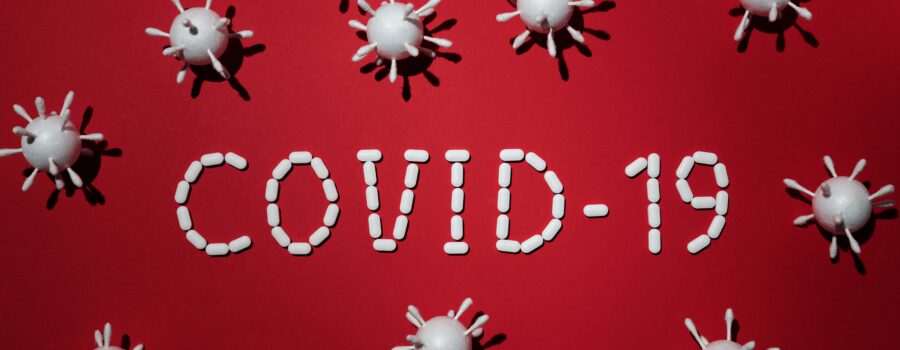As I reflect on the past year, I am filled with emotions and memories. Most people will agree that it has been the most bizarre time in living memory – collectively for humankind. Things may be looking better for us in the UK, but it is far from over for most of the rest of the world; look at how India is struggling.
I remember early March 2020 when it became clear that we were inevitably heading for a UK lockdown and a worldwide pandemic. The world was facing a rapidly-spreading and deadly infection of which scientists knew very little. The reality of that and the uncertainty of what the future might hold filled me with intense fear and anxiety.
Three years earlier, I spent six months in hospital after acquiring sepsis, which damaged my kidneys and spleen, making me much more susceptible to infection, serious illness and even death from this new virus, SARS-Cov-2. Here was a thing – invisible to the naked eye – spreading with enormous speed from person-to-person; country-to-country; and continent-to-continent. Never in my 36 years of being a medical student and a doctor have I felt so scared to be near people.
An overwhelming fear of getting ill, and a strong need for self-preservation, led me to take the very difficult decision – a week before the official announcement came from Prime Minister Boris Johnson – to shield and withdraw from society. As a psychiatrist, my relationships with patients are deeply personal and intimate. The value of observing the fine nuances of body language and facial expression cannot be underestimated, and it is equally important for a patient to see and feel my interactions with them. The important things to consider were how to provide a safe and quality service from home and how I could continue to support my colleagues, who would inevitably have to do certain things on my behalf, adding to an ever-increasing workload.
My employer was quick to support every employee who could work from home to do so. I had the technology to stay connected; patient files were couriered to and from my home twice weekly; Microsoft Teams became the platform for meetings and teaching; my clinics went ahead via telephone or video. I was pleased that I could still provide a good mental health service to my patients, and at the same time, feel safe and supported.
Initially, it was a rather exciting novelty to work from home, but the novelty quickly wore off for me. I was looking forward to a lie-in, but I woke up at my usual time, and instead of doing something interesting or new with the time I would save on my commute, I started work earlier and finished later than normal. My good intentions of making a healthy lunch never materialised, and dinner often ended up being a takeaway from Deliveroo. In the office, I would see people, have an informal chat, have a coffee with someone, share lunch with my team, ask a colleague for advice, and sit together to solve problems. Instead, I sat at the laptop for hours on end, talked to more patients than I would normally, accepted more meetings (it was easier on Teams and didn’t involve travel), and most of all, didn’t have natural breaks and informal, spontaneous interactions with others.
It was nice not to wear my prosthetic legs all the time; it was nice not to worry too much about the clothes I wore; it was nice not to have a shower every day. But these things were not good for me: my normal routine and structure went out of the window; my sedentary days caused wasting of my muscles; I started smoking during the day and drank more at night; my sleeping pattern altered, and I often woke at 3:00 am. I spent a lot of time on Twitter, where countless people described similar things, which gave me a false sense that we were all experiencing the same things and that it was okay, par for the course. After all, we were told we were living in unprecedented times, we were all making sacrifices, life was difficult for everyone, it was for the greater good, and it wouldn’t last forever.
It is not unsurprising that I became obsessed with the news and daily briefings from Downing Street. I carefully followed the statistics in the UK and in South Africa, where my mum and sister live. As the infections and deaths increased here and abroad, so did my levels of fear and anxiety. I became outraged about people who flouted the rules on wearing masks and social distancing; I voiced my disgust on social media. One thing that really made me angry was the behaviour of my neighbours in the flats where I live: on Thursday evenings, they were clapping and banging pots in support of the NHS, and on Friday nights, they got together for parties in the courtyard, while hundreds of doctors, nurses and other key workers were dying in hospitals!
A welcome reprieve came in August when I was allowed to return to the office. I remember the mixed emotions of the excitement of being with other people (although socially distanced) and anxiety about being exposed to the virus. Everyone in the office was very good at sticking to the rules. It actually felt much safer than I envisaged, and things were feeling close to normal. Although I still didn’t see patients in my clinic, I resumed home visits for patients in crisis. This was extremely helpful in getting a well-informed understanding of the patient, their social circumstances and needs, and assessing the potential risks. It also instilled – in the patients and their relatives – confidence and trust in their care. I was feeling useful again. I was promoted and took on a new role. I was nominated for a prize and won. Life was feeling so much better.
My mother was admitted to a hospital in South Africa at the end of November. She was in intensive care with pneumonia for four weeks. This was a challenging period for me. I suddenly shared the worry and pain of so many other people with loved ones in hospitals and care homes, who had no contact with them, couldn’t see them, hug them, hold their hands, and say they loved them. There was no possibility to travel to see her. I was consumed by worry and sadness. She recovered from pneumonia, but after such a long time in bed, she completely lost her mobility, and there was no chance of her returning to her flat. She went to a rehabilitation unit for a further three weeks, where she gradually improved, and she was able to go back to her flat with a full-time carer. I knew how much she hated the intrusion on her privacy and dignity. But like me, she is strong and stubborn. She made me laugh when she sent me a WhatsApp one morning to say she has sacked the carer and could I please pay her and tell her not to come back! I knew then I had my mother back.
I am fortunate that my mum survived, and I thank God for that every day. Unfortunately, one of my patients didn’t survive. I can’t say much about it without breaching confidentiality. It was a tragic case of not receiving the treatment needed to keep her well, which led to her being admitted to a medical ward where she eventually got Covid. The inquest – my first – was stressful, but I knew I did my best for her under complicated and challenging circumstances. I often think about her, wondering and questioning whether I could have done better. Just last week, I received a thank you card from her son. I hope he realises how much I appreciated his kind words.
I think of myself as a resilient person, having survived severe sepsis and returning to work and life as a disabled person. I thought that if I could cope with six months in hospital and losing both legs and most fingers, I could easily cope with shielding, working from home, and social isolation. I was so wrong. The third lockdown and second period of shielding weighed heavy on me. It was winter, cold, dark and damp. I was alone at home. I was worried about my mother. My sister had a relapse of bipolar disorder and was admitted for ECT. My mood became as gloomy and dark as the days. I wasn’t sleeping and eating; my concentration and memory were lacking; I could feel my confidence fading away to the point where I hated myself, where I couldn’t look at my image on a screen in online meetings; I wanted to die.
It took me a while to admit that it wasn’t burnout or Covid related stress but that I was in a deep and dark depression. Why is it so difficult to admit to having a mental illness? Why does it make one experience irrational guilt? Why is it – even for a psychiatrist – so hard to come to terms with it and to take that step of asking for help? Stigma, ingrained systemic cultural and religious stigma, is the answer. Tropes, such as ‘men don’t cry’; ‘don’t be so soft’; ‘pull yourself together’; ‘what’s wrong with you, you have everything one could dream of?’. These are unhelpful and damaging ways of thinking that have been instilled in us over centuries. Society should be there to help and support people; instead, it harms and negates. This is a topic for another day, but a crucial one that needs addressing.
I have taken that first step. I am on antidepressants, and I am starting psychotherapy. It is the beginning of another journey, one of hope and recovery, and I am looking forward to it.


